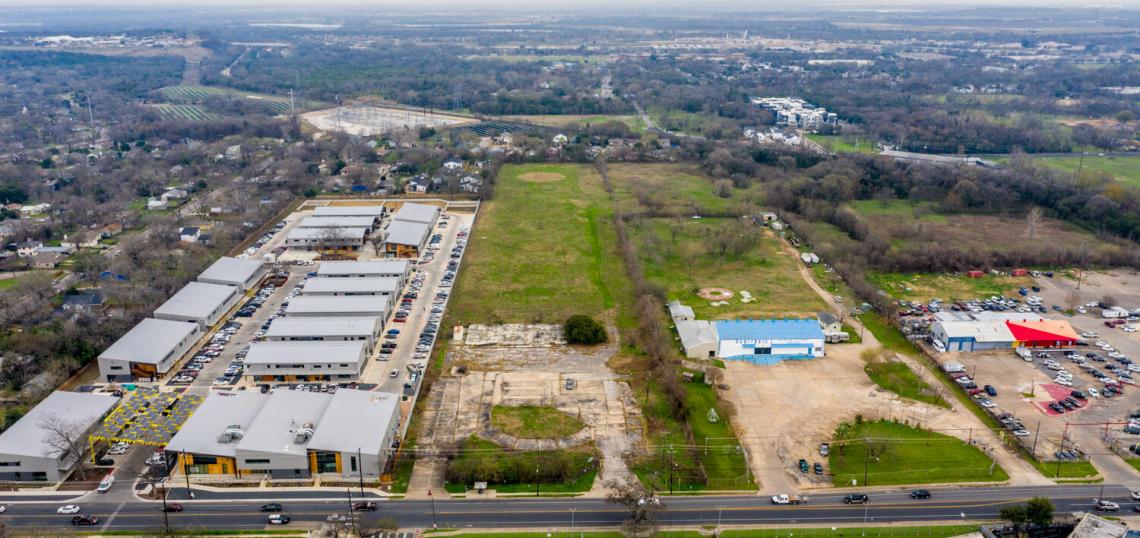Plans for the redevelopment of 30 acres of land at 1011 and 1017 Springdale Road in East Austin moved another step forward last week, with the Austin City Council approving Planned Unit Development zoning for the site on second reading at its June 3 meeting. For more than a year, California-based developer Jay Paul has been negotiating with various city entities and neighborhood groups for the rezoning and a height variance for the project—two six-story office buildings the be raised on the former site of a “tank farm” where oil and petrochemicals were piped in and stored for decades.
Due to contamination from past use—which was eventually discontinued and somewhat mitigated after sustained and concerted efforts by local activist groups, notably People Organized in Defense of Earth and Her Resources—the property cannot be used for housing or public parkland. Jay Paul is pursuing a height of up to 93 feet for the buildings, 33 feet higher than allowed under current regulations. Approval would also mean the company could increase the project’s square footage by approximately 15 percent.
In exchange for the rezoning and increases in height and square footage allowance, the development team is offering around $8 million in “community benefits” (the term generally applied to some of the requirements that come with density bonuses and other variances from standard building regulations that the city can grant builders). Those benefits include a $700,000 donation to the city’s affordable housing trust fund, $150,000 to be paid to the East Austin Conservancy for residential property tax assistance, and $475,000 to the Guadalupe Neighborhood Development corporation, which builds and manages affordable housing for East Austin residents who might otherwise be displaced. In addition, Jay Paul has proposed extensive property improvements that would address flooding in some nearby neighborhoods, and particularly on Saucedo Street, which dead-ends into the property.
The proposal has been approved by the city’s Environmental Commission and endorsed by the Planning Commission, and the City Council has now approved it on first and second readings. Via the Govalle/Johnston Terrace contact team, the official city conduit for planning-related communications, nearby neighborhood associations and individual neighbors have taken issue with the development. Of particular concern is its height, along with its general size—larger than any single downtown office development—which some feel would lead to further gentrification of the East Austin neighborhood. Throughout the process, other neighbors have expressed support for the proposed project, most often citing heightened improvements to prevent or mitigate flooding from the site as well as from nearby commercial properties. Much of the property is in floodplain, and the plan’s landscape design is focused on measures to address that issue as well as on restoration.
Michael Whellan of law firm Armbrust and Brown, which is representing Jay Paul on the development, told the council Thursday that if PUD zoning is rejected, developers would move forward with a plan that would include more impervious cover, less flood mitigation, and significantly fewer community benefits. He noted that preliminary work on the site has begun under an approved site development permit.
Most of Thursday’s council discussion focused not on PUD zoning per se but on how Jay Paul’s donations for affordable housing would be allocated and how much of that money would go toward East Austin housing. In addition, Councilmember Vanessa Fuentes argued for limiting the vote to a second reading to allow more time to address neighborhood concerns, including gentrification and displacement. Councilmember Sabino Renteria, in whose district the proposed project is located, took issue with Fuentes’ invoking the G-word and expressed concern that the community would lose out on significant benefits if rezoning is denied.
After approximately two hours of public testimony and discussion on the dais, the council voted 10-0 in favor of the proposal on second reading only. (Councilmember Mackenzie Kelly was not at the meeting.) It will take up the matter for final approval at its June 10 meeting.






